Now, let’s talk about mobile and hotel websites.
Mobile accounts for over 60% of your online traffic but less than 10% of your sales. Some web marketers believe this occurs because, supposedly, people use mobile for research and prefer to book on desktop. This the second stupidest thing I have ever heard a non-comedian say on stage.
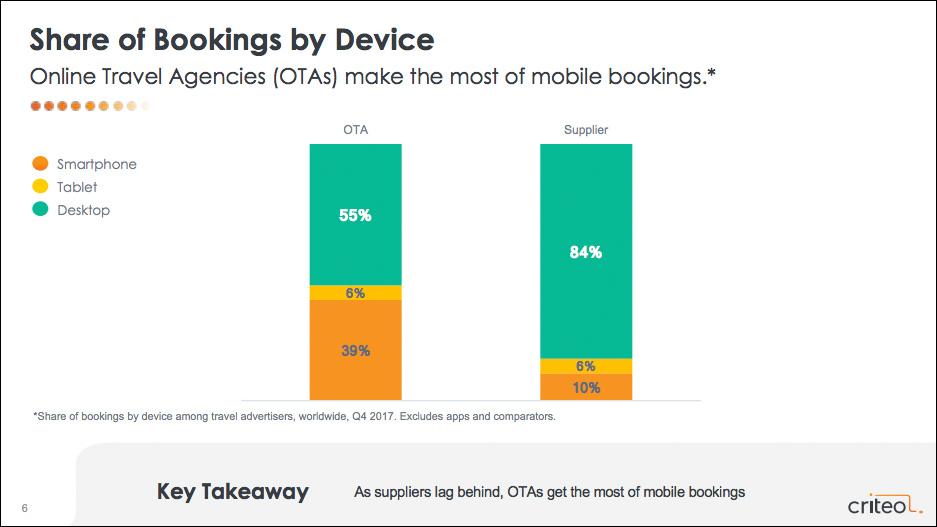
Expecting people that look you up on mobile to make an effort to book directly on desktop is pathological, wishful thinking. There is only one place and one time to sell and it is right here, right now.
Wake up ! Mobile is already responsible for over 40% of all online sales, and tourism is no exception. So why does mobile account for 39% of OTA sales with a year-on-year growth of 63% and hoteliers, hardly 10%?
This article will help you understand why hotels fail at mobile sales. It also suggests some steps you can take regarding mobile and hotel websites, in order to change that.
Key insights
- Mobile is a disruptive technology. Thus, you need to properly assess its ROI in terms of Return on Investment and also in terms of Risk of Inaction.
- Smartphones are not small computers. They obey a different logic. Trying to make your website fit into a smaller screen is not going to help you much.
- Study what works on mobile, mainly apps and Instant messaging platforms. Try to get some marketing insights that you could apply to your own e-commerce strategy.
- The technology you need to be successful on mobile is already here. However, your main hurdle is called the Legacy Effect, a.k.a. your own resistance to change.
ROI: Risk of Inaction
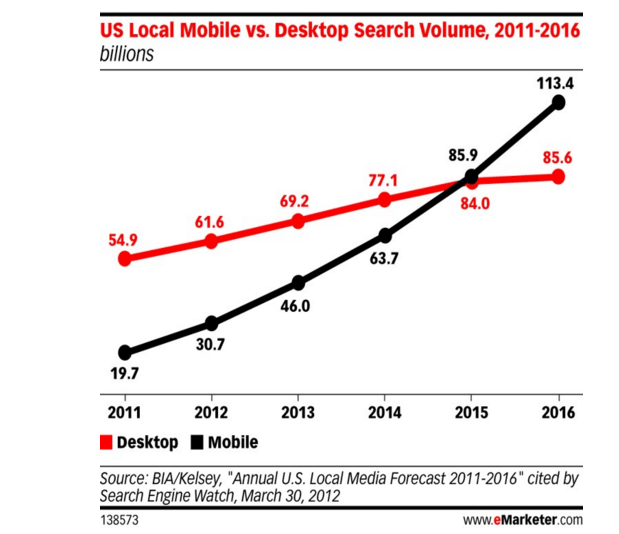
While making a decision, people love to assess its ROI and rightly so. ROI is usually the benefit you expect from performing an action. It is also the danger of not doing anything, a.k.a, the Risk of Inaction.
While thinking about your next strategic move, you should consider these 2 sides of ROI. This is because when you’re dealing with disruptive innovation, keeping the status quo will have a positive Return on Investment for a while. But, the Risk of Inaction will grow exponentially. It’s like the Titanic – it was fine on its course until it wasn’t.
Mobile has become the number one device in terms of search volume. In such a case, keeping a web-focussed mindset is obviously quite dangerous. Of course, you have a responsive website but what I’m trying to tell you is that you won’t solve the issue by making things smaller. To be successful, you need to understand and apply mobile logic.
Innovators always encounter the same dilemma where the incumbent technology (desktop) is still performing quite well and still offers higher performances. The issue is that the older tech has already expressed all its potential while the new one (mobile) is constantly growing. The problem is that you can’t switch from one technology to another overnight because of something called learning curves.
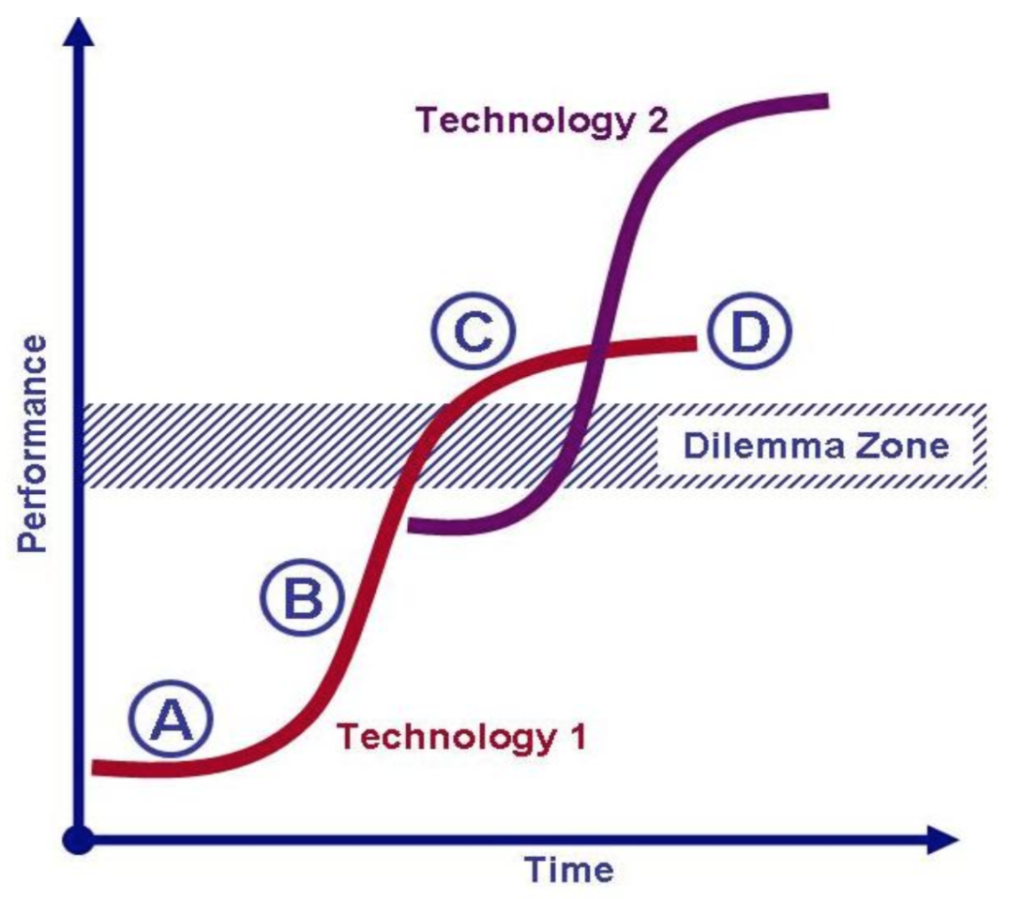
While desktop is not likely to disappear, mobile is the new fuel for e-commerce. You should learn its rules to avoid running out of gas in the middle of the road.
Mobile websites: be practical for your customers
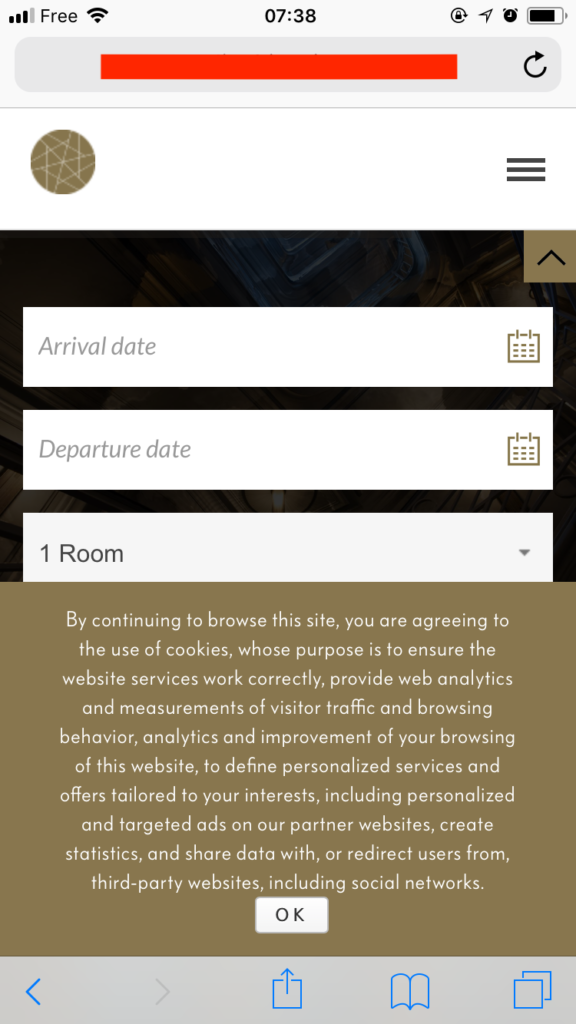
I recently visited the mobile version of hotel Nxxxxxxxx 5* Paris. Before you can see anything, the cookie policy pops up. Moreover, the booking engine keeps invading the screen every time you move from one page to another. After 20 minutes, I called Cecile from the hotel and she explained to me how to turn off the BE pop-up. How many of your customers will be willing to make the effort to understand you? Make sure you always go for minimum effort. You’re in the business of selling hotel rooms, not IQ testing.
Any sales action is defined by the MAT factors (Motivation, Ability, and Trigger). The amount of thinking that your customers need to complete an action on your website decreases their ability to buy and hinders sales. This example is one among many. Before pitying this hotel, have a good look in the mirror because anyone could make the same mistakes.
Smartphones are not small computers
‘Interface determines behavior’ is the most inspiring thing I have heard a marketer say on stage. We are irrational and convinced of our own free will. However, in actuality, external factors influence our actions much more than we can imagine. (For more on this see Rory Sutherland’s life lessons from an ad man and all his brilliant talks).
You know that if you want to sell something, the format is just as important as the content. So you put much effort into having a beautiful website. However, aesthetics are not a format! The format is really the architecture (a.k.a. interaction design) and graphic design is just the paint.
And no, it is not good as long as it fits ! Of course, it is physically possible to make a reservation through mobile responsive websites. In any case, people don’t do it because each format has its own logic and responsivity equals forcing a desktop format on a smartphone! Searching and clicking is very comfortable on desktop but very clumsy on smartphones because we all have small screens and fat fingers.
Mobile marketing is all about interaction – not click, scroll or change page. Let’s get inspired by what works instead of clinging to web.
- Apps are out of your reach unless you are Booking.com because people will download on average 15 apps that they will use very frequently. And you’re not one of them. Do not expect people to go out of their way for you. In fact, even Booking.com is not only capitalizing on apps but also colonizing Facebook Messenger (https://youtu.be/MEG2VOS6t7o).
- Instant messaging is probably a better option since it is more open, inexpensive, and people spend most of their mobile time there. Their key characteristics are:
- Conversational: Offer content available on demand.
- Relationship-based: Multiple interactions, think about customer centricity and customer engagement.
- Omnichannel: Do not make the customer come to you. You go to him instead as he is free and welcome to choose his favorite messaging app to interact with your brand.
The term ‘mobile first’ was coined to go even further and affirm that we should not look at mobile as an extension of web, but quite the contrary. Mobile is influencing people’s behavior even on desktop.
So how do you make marketing as natural as a WhatsApp conversation ?
Interactivity
In the last few years chats have popped up in most e-commerce websites but they come at such a high HR cost that most hotels can’t afford it. Some chat outsourcing options are available but are not sustainable in the long run. This is because you are not looking for a quick fix, but really trying to address a key strategic challenge as mobile becomes the core of your e-commerce strategy. Outsourcing customer interaction just as you do with your laundry proves disastrous in the long term as you do not grow your company’s learning curve.
Chatbots can be a good place to start looking. That’s why I decided to invest so heavily in them. When I started, as soon as someone mentioned robots interacting with humans, everyone freaked out. Now it is widely accepted across industries. Conversational agents are not to be compared with humans but with websites.
They make your content available according to the specific needs of each customer on any platform – web, Facebook, WhatsApp, etc. They can manage all repetitive tasks which account for 80% of all customer interactions and require human assistance only for tasks they can’t manage. The experience looks like this: https://youtu.be/tlTsDQRoIoo
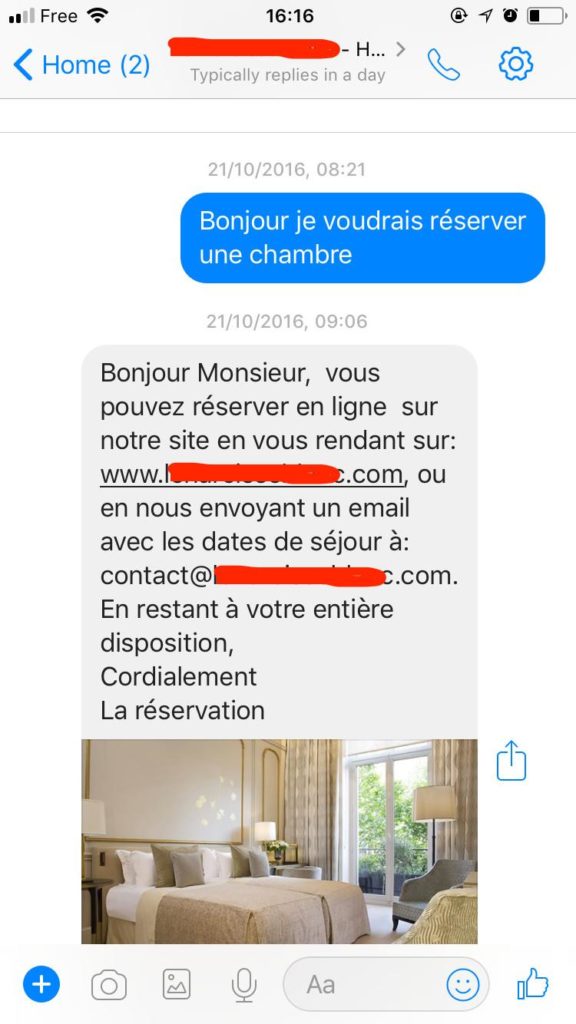
Customer centricity
Customer centricity should be at the heart of marketing efforts in case of both mobile and hotel websites. Mobile is a personal device and your mobile strategy should be aimed at creating a relationship. When customers are interacting with your brand on mobile they are focussing on you. Make that time count and occupy as much brain space as possible and go as deep as possible to create a barrier for entry for your competitors.
Omni-channel approach
Instant messaging and social networks are key components of your mobile strategy and shouldn’t be treated as sidekicks. Here is a clear example of a hotel missing the point of Facebook and it probably isn’t the only one. If a customer wants to book by chatting on Facebook Messenger that’s his right and hotels should accommodate him, just as Booking or Expedia do. => Expedia Facebook Messenger Booking
All the main instant messaging channels are now open for business: Facebook, WhatsApp, WeChat, iMessage etc. And new technologies are available to make omnichannel communications easy to manage. It looks like this: https://youtu.be/uREEJl_3M5c
Mobile and hotel websites are both in play today. Mobile is the key platform but it doesn’t mean that websites are going to disappear: They will evolve (see Bing screenshot below). Your customers will still use them at least for a while longer. But understand that customers’ behavior is now determined by what they can do on mobile.
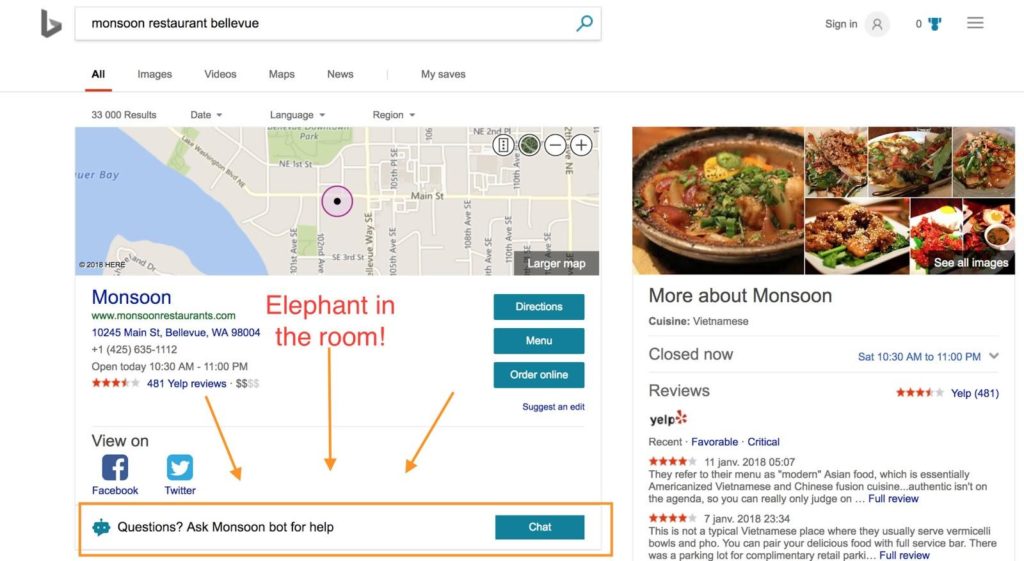
So what now?

The challenge is not technological but psychological. The technical resources you need to be successful on mobile are available. The main hurdle is your own resistance to change. For 15 years you’ve been fighting to develop an online presence, and the rules of the game are changing while you have never been as good online as you are today. This is called the Legacy Effect and measuring the Risk of Inaction is a good first step to fight it.
If you’d like to discuss more about mobile and hotel websites or have questions about AI in hospitality and hotel chatbot, please visit our website or contact Benjamin Devisme at bde@quicktext.im


